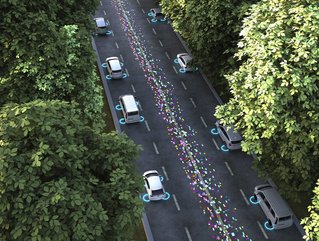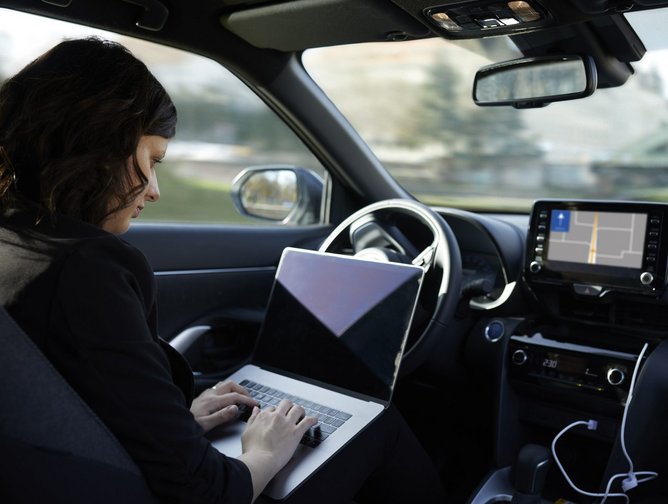Automation and AI tech changing the way the world moves

It all started with the invention of the wheel in the 4th millennium BC – human ingenuity transformed the way we move around our world and transport our goods. It was a watershed moment that enabled a revolution in human progress spanning construction, farming and migration. Today, we are on the cusp of another watershed moment in transport, propelled by the convergence of emerging digital technologies – and the maturing of the infrastructural services and skills to master them.
How we move around the world and transport our goods is ever more critical today, for people and planet. According to the UN, nearly 70% of the world’s population will live in cities by 2050. This makes the performance of modern networks to support connectivity as we move through these environments even more critical – particularly as we look for greater efficiencies, sustainability and intelligence across transport networks and supply chains.
But today’s progress faces evolving challenges. Exacerbated by the pandemic, global conflicts and just-in-time resourcing, the supply chain crisis continues on – and is expected to linger well into next year. Meanwhile, citizens and governments are prepping for the rise of autonomous vehicles, as businesses adapt to the new normal and its implications for demand of increasingly intelligent transport networks. It is clear that digital technologies are poised to not only have their day in the transport industry, but to save the day with smart solutions. But it’s not necessarily going to be an easy drive.
Connected cars, virtual assistants and autonomous tech to dominate future of auto industry
The technologies that propel the quest forwards towards autonomous vehicles are progressing through the Gartner Hype Cycle, with some far closer to the slope of enlightenment than others. The transformational technologies with near-term maturity include connected car platforms, virtual assistants and embedded SIM (eSIM). The majority of high-benefit technologies, including 5G, automotive real-time data and over-the-air software updates will also mature in usage over the next five years. Longer term, electric vehicle technologies and autonomous vehicle technologies will dominate the transformation of the auto industry, according to Gartner.
The pace of transformation might feel sluggish for those in the front seat – but it is fast and furious compared to pre-digital industrial revolutions. It's estimated that by 2025, when 100% of all new vehicles to market will be connected, there will be more than 400 million connected passenger vehicles alone. But it’s not only consumers who will benefit from slicker connected transport systems.
The logistics industry will be a major beneficiary of our quest towards greater automation within the transport industry, going some way to ease supply chain bottlenecks. From the automated cranes and robotic machinery already functioning in ports and warehouses, to automated delivery vehicles like the Autonomous Vehicle trucks trialled recently in the US – the progress we are seeing will transform future supply chains and solve current sore points like driver shortages and efficiency challenges.

The bottom line is that more connected cars require connected vehicle ecosystems in smart cities to facilitate the shift – with well-crafted edge infrastructures set up to absorb the data deluge. Governments are already working to build the necessary ecosystems and prepare citizens for the changes ahead. In the UK for example, the first autonomous bus scheme is rolling out and the government has just updated the highway code in preparation for autonomous vehicles. It is the back-end data infrastructure that forms the foundations for these technologies – with autonomous vehicles producing 300TB a year, optimised data management is mission critical.
Investing in resilient, cyber secure and agile cloud computing strategies, that utilise powerful compute and ignite real-time analysis and decision making from edge devices is absolutely crucial. It’s critical now, not tomorrow. We are already driving partially automated, intelligent cars – but they are about to get smarter. Building networks and ecosystems that can handle this data – as much as 40 terabytes of data an hour from cameras, radar, and other sensors from driverless cars – will determine the success, the safety, and the experience of autonomous driving.
Partnering with trusted technology specialists, to build and manage these infrastructures is the final piece of the puzzle. It will ensure that the full ecosystem is finely tuned, prepared for a symphony of data. Germany recently approved its first level-3 autonomous vehicle, while highway codes are being adapted across the continent in preparation for a new era of travel and logistics. Staying ahead of the curve is possible now, if we lay the groundwork together we can truly move the world.
To read another article from Jordan MacPherson click here.






